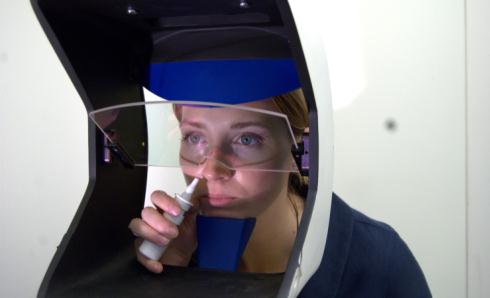As part of a research project carried out by Siri Leknes, a research fellow at the Department of Psychology at the University of Oslo, 40 healthy students were administered nasal spray containing a dose of either saltwater or oxytocin. They were subsequently shown photographs of faces displaying angry, happy or neutral expressions. Some of the photos showed individuals displaying more “hidden” emotional expressions which tend to be picked up at a more subconscious level. Mostly, the oxytocin intensified test subjects’ awareness of the emotions present in the photos.
"Faces expressing anger stood out as angrier and less happy, and correspondingly, faces expressing happiness were happier,” says Leknes. “We know that people express feelings in other ways than through facial expression alone, for example, by means of body language and vocalisation. We presume that our findings also apply for these modes of expression.”

An instrument was used to measure dilation of the pupils and how test subjects focused their gaze while solving tasks on a computer screen in front of them. Photo: Olga Chelnokova
There were two rounds to the experiment to ensure that all student subjects were tested using both salt water and oxytocin – without letting them know which dose they would be receiving each time.
“It turns out that those with the lowest aptitude for judging emotional expression properly – that is, those with the poorest scores during the saltwater round – were the ones who showed the greatest improvement using oxytocin. This is really fascinating; the people who need it the most are thus the ones who get the most out of using the hormone,” said Leknes.
So not mind reading as much as providing a boost to people who don't perceive emotion very well.
Based on previous research , Leknes believes in oxytocin’s potential as a supplementary treatment for people suffering from mental health disorders or drug-dependency because, she says, nearly all mental health disorders involve a diminished ability to recognize the feelings of others. The same applies for drug abusers.
“Oxytocin will not be a cure-all for mental illness or drug addiction, but it may be of use as a supplementary treatment. It may make individuals better equipped to interpret the signals of others around them, which may improve how they function in social settings,” Leknes explains.
Oxytocin nasal spray is available via prescription and is relatively safe when used as directed. Side effects are extremely rare. Doctors are already allowed to prescribe oxytocin for the treatment of various problems associated with social functionality, such as autism. So next they want to examine how well oxytocin works as a supplementary treatment for drug abusers.
“If it turns out that our assumptions are correct, then we may be able to come up with a simple treatment that would mean a great deal for people who find it difficult to pick up on the social cues of their peers,” says Leknes.




Comments